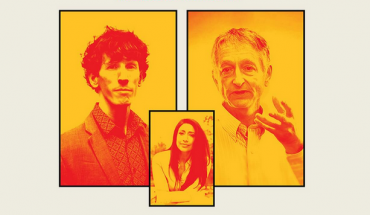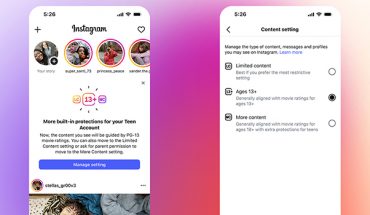As coronavirus infections and cases of COVID-19 increase here at home and in countries worldwide, the need for effective countermeasures to fight the spread itself, much less for reliable information to fight our confusion, anxiety, or skepticism about the spread, is paramount.
Government ministries and public health agencies here in Canada have been providing information at near-daily in-person press briefings; through official pronouncements and press releases; and across the media landscape, with websites, radio and TV commercials, and social engagement. Other platforms may be considered for spreading the word with no clear signs that the virus spread is letting up.
As important as the official sources may be, there still can be a need for options and alternatives, especially if those options are focused on getting reliable and credible information to specific audiences and target groups who may not otherwise be well-served.
As just one example, the homeless. And in particular, young people who find themselves on the street. Youth without a solid base, having perhaps run away from home or dropped out of school.
An organization called PEACH (Palliative Education and Care for the Homeless) operates in Toronto, and palliative-care physician Dr. Naheed Dosani is a lead doctor with the project. He uses platforms like TikTok and Instagram to reach a younger audience and share information about the pandemic. On Twitter, he’s part of the #COVIDzero campaign, which has an ultimate and admirable eponymous goal.
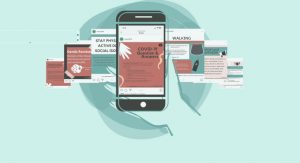
The On COVID-19 Project, with a well-designed website and comprehensive social media platform, targets young Canadians with reliable information about the pandemic.
Not wanting to distract from the reliable resources provided by public health officials, the team at the On COVID-19 Project still felt frustrated about what they saw as ineffective public health communication strategies, especially when trying to reach young Canadians.
So Markham, ON’s Samanta Krishnapillai, described as an “equity-oriented health scientist”, started the On COVID-19 Project, launched with a well-designed website and comprehensive social media strategy.
Introduced back in June, the Project is a co-operative grassroots, volunteer-based endeavour. The team describes itself as “your friendly neighbourhood nerds, active citizens, and change-agents” and they describe their target audience as Millennials and members of Gen Z.
By understanding and effectively harnessing the potential of social media, the On COVID-19 Project can disseminate information that is shareable and easy to understand. The goal is to create content that is credible, concise, and Canadian.
The team clearly points out that the information posted is not a substitute for information from health care providers, and that it should not supersede information shared or directives given by public health officials.
While reading information and learning from the content shared by the On COVID-19 Project team, site visitors are plainly told the first point for online information regarding COVID-19 should be the Federal Government of Canada and the World Health Organization.
Even so, the youth-led and volunteer-based team cross-checks information across reputable platforms to bring added confidence in what they are publishing.
As noted on its website, the Project team feels that “[i]n the era of fake news, it is imperative that the information we consume is reliable and credible. We commit to finding accurate and well-sourced information that didn’t come from the deep cuts of Reddit or Wikipedia.”
Much of the site’s provided information has an easy, plain-language feel, so it is readily accessible to as many readers as possible.
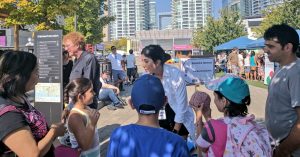
‘Science Sam‘, a.k.a. Dr. Samantha Yammine, takes questions about science during a pre-COVID live event at Harbourfront Centre in Toronto.
The site encourages feedback and question-asking, so there’s an interactive aspect to the platform, as well.
Asking questions is surely a scientific endeavour, if not a purely human one. And answering those questions is certainly what fuels ‘Science Sam’, a.k.a. Dr. Samantha Yammine.
(I first encountered ‘Sam’ at a live science event staged at Harbourfront Centre a few years back. Walking along the boardwalk, enjoying the sun and sights, one could stop and ask questions of an assembled group of scientists, environmentalists, doctors, and clinicians who were presenting at the event.)
Dr. Yammine is a PhD and neuroscientist as well as a science communicator and social media user. On Instagram, Science Sam has long had a loyal following
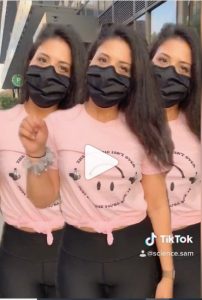
Social media platforms like TikTok, among others, are being used to disseminate reliable information about COVID-19…and fancy dance steps.
for her broad-based science storytelling, while more recently her use of social media connects almost 100,000 followers to the timely and relevant information about science and COVID-19 she is providing.
Her feed of detailed tips for social distancing is very popular, and of course, she uses the platform to answer any questions she may receive and to share good information and resources she has found elsewhere. She’s also organizing live-stream events with other experts.
Interestingly, and appropriately, Science Sam and others know that they are not the be-all and end-all of coronavirus information. What information they do provide is good, the links they share are great, but they know they do need help in spreading the good word.
Science Sam explains the deal like this: “[H]ere’s what I need from you: please use your social media for good. Take selfies in masks and share them… Share videos of you socializing virtually or from a distance outside in masks… Model that safe behaviour you wanna see other people doing…”
Yes, fighting a disinformation pandemic can be complicated, almost as much as fighting a global disease outbreak. Yet with the right information, the right approach, the right responses from everyone involved, both can be contained.
# # #
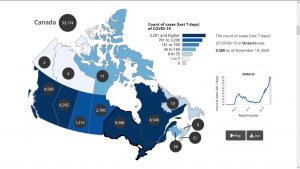
The Government of Canada updates its COVID-19 epidemiology summary and map every evening.
-30-


